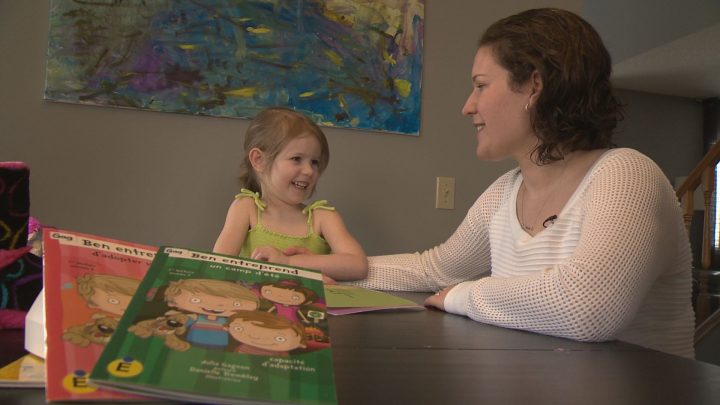“Est-ce que je peux aller à la salle de bain?”

That’s it; the culmination of my intermittent French education. I was enrolled in French until Grade 9, took a translation class in university and even a conversational course as an adult. Yet, ask me to contribute something clever to a conversation in French and I will immediately reply with a request to relieve myself. Yikes! Can you imagine the career, educational and travel opportunities I’ve missed out on as a result?
READ MORE: What Canada’s population will look like in 2036
As a kid, there was a French immersion school across the field from my house, but my Anglophone parents enrolled me in the English school, afraid they wouldn’t be able to help if I had homework or questions in French. My husband and I now struggle with the same concerns as we consider where to send our son for Kindergarten. Every parent wants their child to thrive and not all kids will succeed in an immersion program.
The benefits of being bilingual, however, extend across the board. Researchers from the University of Calgary recently published a literature review of dozens of studies on the perks of second-language learning.
“Imagine if someone told you that you could take one step that would enable you to travel more freely, get paid more, read some of the world’s best literature, perform better in school, increase your focus, and enhance your understanding of other cultures,” states the Literature Review on the Impact of Second-Language Learning.
“The fortunate news is that second-language learning is the one step that learners can take that will lead to these and other benefits.”
After combing through dozens of research articles, the research team lists more than 30 key points. Here are a few:
Cognitive impact
- Bilinguals outperform monolinguals on many cognitive tasks including solving problems, multitasking, remembering longer lists of information and switching between tasks
- Speaking more than one language helps to compensate for cognitive disadvantages that result from aging, epilepsy and low socioeconomic status
Academic impact
- Second-language learners often show enhanced spelling ability as well as superior reading comprehension when they are compared to their monolingual peers
- Children receiving second-language instruction often show higher achievement in a range of subject areas, including mathematics, science and language arts
Economic impact
- Employees who speak a second language often earn more than monolinguals
- The ability to speak a second language often positively affects earnings both directly and indirectly through educational achievement, a wider range of opportunities for involvement in local and global markets, and by signalling enhanced communicative and cognitive abilities and skills to potential employers
Societal impact
- Second-language learners demonstrate enhanced empathy, awareness of diversity, tolerance of difference and a greater sense of social justice
- Learning second languages encourages learners to embrace scientific, social and environmental ideas originating from other parts of the world
Personal impact
- Knowing a second language can act as a source of pride and self-esteem
- Studying abroad and language exchange programs often lead to enhanced second-language abilities. They also motivate students to seek expanded job and travel opportunities, and they contribute to feelings of independence, maturity, patience and flexibility
As I chat with the review’s principal investigator, Mary Grantham-O’Brien, my mouth waters. I envision my son chewing on a baguette under the Eiffel Tower, wowing his new Parisian friends with eloquent French. Perhaps, I could tag along?!! But, wait a second! How can I help him with homework when I only know how to ask to use the washroom?
“Ne t’inquiète pas,” she says. (That means, ‘no problem’). Grantham-O’Brien says there are plenty of resources for parents whose child is learning a second language and you can often get away with explaining a concept in English and leaving it up to your child to do the translation. Michael Tryon, from Canadian Parents for French, says you can also send a note to your child’s teacher with questions the following day. I could handle that.
What did you consider before enrolling your child in a monolingual or bilingual school program? What were the perks and pitfalls of your child’s experience? Join the conversation here.



Comments